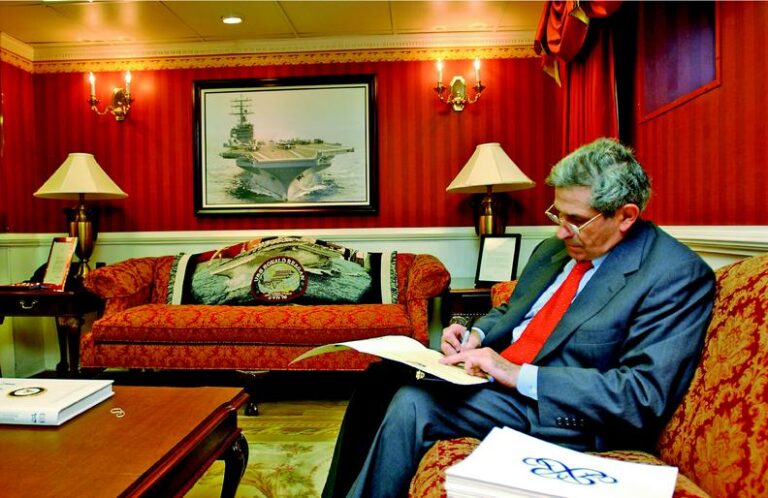The bulk of Why We Fight goes about proving that Eisenhower was dead on the money. Interviews run the gamut from conservative (Project for the New American Century founder Richard Perle) to liberal (brainy author Gore Vidal). While archival footage places it all in historical perspective, filmmakers give us intriguing behind-the-scenes portraits that put a face on this amorphous entity known as the military-industrial complex. We meet a Korean War refugee who, rather paradoxically, designs bunker buster bombs. We listen to a fighter pilot who describes, in detail, dropping the first bombs on Iraq. We go behind the scenes of a military trade show where the latest in death-dealing equipment is hyped up like the newest and glossiest Hollywood offerings.
What emerges, none too surprisingly, is a picture of war no longer run by generals or even by politicians, but by corporate executives and industry lobbyists whose multibillion-dollar livelihood is based entirely on the maintenance of a constant state of armed conflict. War is profitable. Hugely profitable. Even back in his day, Eisenhower lamented the fact that one destroyer could build two state-of-the-art hospitals, house thousands or feed millions.
Why We Fight doesn't advance too many new theories about the way the world is run, but it certainly clarifies all the would-be invisible threads leading inexorably to our current state of affairs in Iraq. Saddam Hussein was a powerful United States ally for decades–funded, trained and armed by America. Eventually, like all the dictators our country has backed, he got out of control. Our country's vice president, a powerful and fully paid lobbyist for the military-industrial complex, seized on this opportunity to transform America into a full-time war economy. Finally, President Bush bent the patriotic fervor over 9/11 into an excuse to invade Iraq, a perceived straw dog target. Needless to say, things didn't work out exactly as those in power had hoped. Still, companies like Boeing and Halliburton made their money–so any incidentals like collateral damage, dead American soldiers and a near total loss of the worldwide sympathy generated by 9/11 were irrelevant.
Sadly, despite the relevance of its information, Why We Fight is still only likely to preach to the converted. America's divisions (Democrat/Republican, liberal/conservative) now seem cast in iron. Those who still pledge their blind fealty to the Bush/Cheney/Rumsfeld triumvirate will refuse to see a film like Why We Fight on pure principal. Even if they saw it, those on the far right of the ideological perspective would continue to argue that there's absolutely nothing wrong with having a military-industrial complex and that greed, for lack of a better word (as Gordon Gekko said in Wall Street), is good. To hell with what pinko commies like Dwight Eisenhower and George Washington (who used his farewell address to argue passionately against a “standing military”) had to say–what's good for Halliburton is good for America!
There are no earth-shattering revelations in Why We Fight; its content is more editorial then reportorial. Still, the film does contain many small moments of frightening clarity. The B-1 Lancer Bomber, it is revealed, has at least one part manufactured in every state of the union. Why? Because that way, no member of Congress can kill the expensive project without sacrificing jobs (and therefore votes) back home.
Perhaps the most enlightening sequence in the film is the one that follows former NYPD officer Wilton Sekzer, who lost a son in the World Trade Center attack. Sekzer was so angry and hungry for vengeance that he begged the military to paint his son's name on one of the first bombs dropped on Iraq. They did. Then Sekzer heard President Bush admit that–despite what he'd implied for years–Iraq had nothing to do with 9/11. “They abused my patriotism” concludes the grieving father.
Why We Fight isn't merely the title of this provocative documentary. It's also a question posed to nearly everyone on camera–from professional speakers to political wonks to average Joes on the street. “Why do we fight?” Perhaps the scariest conclusion is that few people are able to come up with a clear answer.




